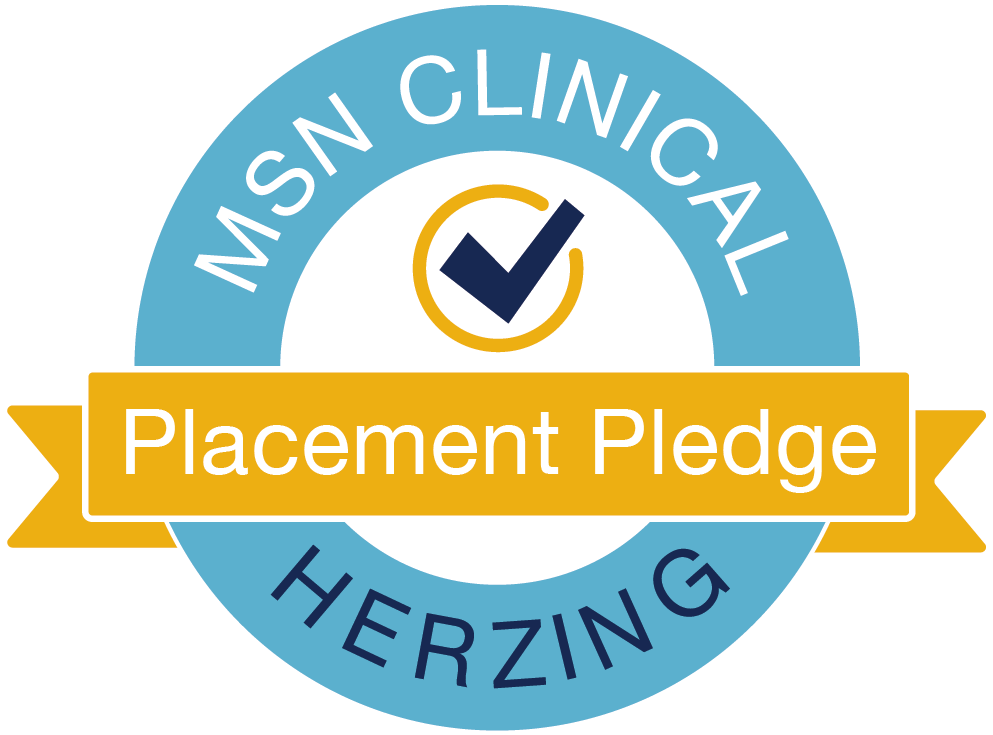Become a nurse practitioner with Herzing University
To become a nurse practitioner, you will be required to complete graduate-level nursing courses in a Master of Science in Nursing (MSN) or Doctor of Nursing Practice (DNP) degree program. Herzing University offers an online CCNE accredited1 MSN program with unique specializations focusing on several different types of nurse practitioner specialties:

AGACNP
Adult Gerontology Acute Care NP Programs
Specialize in the adult population (ages 13 and above) in a critical care environment.

AGPCNP
Adult Gerontology Primary Care NP Programs
Become a crucial facilitator managing your adult patients’ long-term healthcare plan.

FNP
Family Nurse Practitioner Programs
Focus your care in family practice and care for patients across the lifespan.

PNP
Pediatric Nurse Practitioner Programs
Specialize in the pediatric population (up to age 21) in a primary care role.

PMHNP
Psychiatric Mental Health NP Programs
Deliver holistic psychiatric care as an NP specializing in mental health and wellness.

WHNP
Choose an NP specialty dedicated to women's health across the lifespan.

Ranked by U.S. News & World Report as one of the best online graduate nursing programs in 2025
The Herzing University Difference
At Herzing, we want to help you become the NP your community needs—and help you reach your career goals. That’s why we provide:
Online Classes
Convenient online education classes that let you work and study at the same time.
Mentorship
Mentorship and guidance from doctoral-prepared nursing faculty with extensive clinical experience
Clinical Experience
Access to a clinical placement coordinator and our clinical placement pledge.
Exam Prep
Certification exam preparation as part of your degree.
Learn More Today!
How long is NP school?
How long it takes to become a nurse practitioner depends on what education you’ve already earned and your chosen degree pathway.
I am not a nurse
3-5 yearsi
I am an RN with an ADN
2-3 yearsii
I am an RN with a BSN
As few as 20 monthsiii
i. The fastest path is first completing an Accelerated BSN program (as few as 20 months), then an MSN – Family Nurse Practitioner program (20 months).
ii. The fastest path is an Accelerated RN to MSN program (as few as 24 months). You may also choose to first earn a BSN in an online RN to BSN program (as few as 12 months), then pursue an MSN in our MSN program (20-24 months).
iii. The estimated length for our MSN – Family Nurse Practitioner concentration. Our other NP concentrations can take as few as 24 months (2 years) to complete.
Your clinical placement is our pledge.
We understand securing clinical placement as part of an NP program is one of the biggest concerns students face. At Herzing, we offer guidance and support through our step-by-step Clinical Guidance Process to ensure you can get the clinical practice experiences you need.
As a Herzing student, we’ll encourage you to find your own preceptor and clinical sites as there are many benefits to doing so. However, we provide extensive support should you find difficulty along the way. With Herzing, you are never on your own.
Because of our strong relationships with healthcare providers across the U.S. and our comprehensive Clinical Guidance Process, we are confident in our ability to help you find clinical placement. So much so that if you are unable to find a clinical site on your own, we pledge to step in and help you secure clinical placement.*
* Subject to terms and conditions outlined in the enrollment documents.

Waived Enrollment Fee
Discover the educational pathway designed to maximize your career potential. Reach for greater heights with Herzing University.
Tuition & Cost
Tuition & Cost
Our goal is your career advancement. That’s why we are always working to improve our curriculums and processes to make our nurse practitioner programs as affordable as possible while preparing you best for success in your work.
The cost of tuition for our nurse practitioner programs is $770 per credit. Overall cost can be reduced through transfer credit from prior college coursework, scholarships and grants, loans, VA and military benefits, and several additional options for financial aid.
With Herzing University, you are never alone, and we offer many options to help you invest in yourself, earn your master’s degree in nursing and become a nurse practitioner.
Scholarship Opportunities
We are proud to have awarded $13+ million in scholarships and grants to nursing students in 2024.
An affordable, career-focused education is possible with Herzing University.
Faq
Frequently Asked Questions
Didn't find the answer to your question? Send us an inquiry and we will be happy to answer all your questions!
No. To become a nurse practitioner, you will need to earn a Master of Science in Nursing (MSN) or Doctor of Nursing Practice (DNP) degree.
While we do not currently offer a single dedicated program for those looking to go from non-nurse to nurse practitioner, we do offer several online nursing programs for non-nurses with eligibility in several U.S. states.
If you have no experience in nursing, you have a long way to go before practicing as a nurse practitioner. Nurse practitioner represents a type of Advanced Practice Registered Nurse (APRN) demanding extensive education and experience. You cannot become a nurse practitioner without a nursing degree.
To become a nurse practitioner you will need to earn a Master of Science in Nursing (MSN) degree.
We offer an MSN Direct Entry program for those with a non-nursing bachelor’s degree to provide a faster pathway to graduate-level study. You will then need to enroll in a post master’s certificate program to earn the specialty skills required to practice as an NP in the concentration of your choosing.
There are two types of general NPs: Adult Gerontology Primary Care Nurse Practitioners (AGPCNPs) and Family Nurse Practitioners (FNP). Both NPs provide ongoing health counseling, prevention and management for their patients.
The primary difference is the patient population they care for: FNPs practice across the lifespan in family practice, including pediatric, adult, and geriatric care. AGNPs work only with adolescent, adult, and geriatric patients.
If you are open to working with children you may choose the FNP path, while those who prefer to work with adults only may choose the AGNP path.
Nurse practitioner represents an advanced practice role in nursing—it’s not an easy job, and our goal is to prepare you best for success! We strive to keep coursework manageable, but provide you with the knowledge, skills, and valuable clinical experiences to succeed as a nurse practitioner.
Our goal is to help you balance the challenge of an NP curriculum with everything else in your life, including your work, family and friends. You can take courses at the right pace for you, so you can get the most out of going back to school and be ready to practice as a nurse practitioner.
Here’s a selection of the most common types of nurse practitioners:
- Family Nurse Practitioner (FNP)
- Adult Gerontology Acute Care Nurse Practitioner (AGACNP)
- Adult Gerontology Primary Care Nurse Practitioner (AGPCNP)
- Pediatric Nurse Practitioner (PNP)
- Psychiatric Mental Health Nurse Practitioner (PMHNP)
- Women’s Health Nurse Practitioner (WHNP)
Each specialty has its own unique requirements in terms of job experience and certification.
Primary factors influencing nurse practitioner pay are experience, where you work, degree level, and the state in which you practice. Your specialty, and the demand for those services in your area, can also potentially impact how much you can make.
According to the Bureau of Labor Statistics (BLS), the highest paid nurse practitioners work in Community Food and Housing, and Emergency and Other Relief Services industry, indicating nurse practitioners working in emergency care may demand the highest salaries on average. However, specialty is just one of many factors influencing pay, and it’s still possible to make a competitive salary in primary care, acute care, family practice, mental health or any other NP focus.
The highest degree you've earned can also make an impact. Earning a Doctor of Nursing Practice (DNP) may increase your salary potential as a nurse practitioner. Medscape’s 2021 APRN Compensation Report states nurse practitioners with a doctorate make about 5% more than those with a master’s degree.1
The BLS reports nurse practitioners across all specialties earn an average annual salary of $132,000 per year ($63.46 per hour).* No matter the specialty, nurse practitioner represents a potentially lucrative career path with an average salary well above the national average across all occupations.
1. Hurt, A. (2021, December 3). Average income for advanced practice nurses continued to increase during pandemic: Survey. Medscape. https://www.medscape.com/viewarticle/964081
Yes! It’s a career path with excellent pay, a very positive employment outlook, and full of potential to make a real impact in your community helping people heal.
Accreditation & Disclosures
1. The master's degree program in nursing, doctor of nursing practice program, and post-graduate APRN certificate program at Herzing University - Madison are accredited by the Commission on Collegiate Nursing Education (http://www.ccneaccreditation.org).
Herzing University is approved to offer programs in an online learning modality through association with the main campus in Madison, Wisconsin.
* BLS pay estimates calculate the median annual wage for various occupations. Per the BLS the median wage for an occupation is: "The wage at which half of the workers in the occupation earned more than that amount, and half earned less. Median wage data are from the BLS Occupational Employment and Wage Statistics survey." Bureau of Labor Statistics (BLS), U.S. Department of Labor, Occupational Outlook Handbook 2024. BLS median wage estimates do not represent entry-level wages and/or salaries. Multiple factors, including prior experience, age, geographic market in which you want to work, and degree level and field, will affect career outcomes, including starting salary and earnings as an experienced employee. Herzing neither represents that its graduates will earn the median salaries calculated by BLS for a particular job nor guarantees that graduation from its program will result in a job, promotion, particular wage or salary, or other career growth.
Recent Blog Posts
Waived Enrollment Fee
Discover the educational pathway designed to maximize your career potential. Reach for greater heights with Herzing University.






